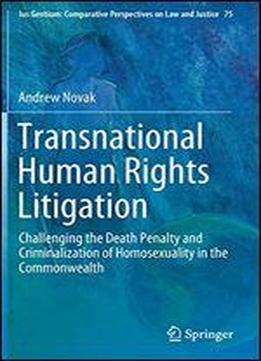
Transnational Human Rights Litigation: Challenging The Death Penalty And Criminalization Of Homosexuality In The Commonwealth
by Andrew Novak /
2019 / English / PDF
3.3 MB Download
This book analyzes the role of strategic human rights litigation in the dissemination and migration of transnational constitutional norms and provides a detailed analysis of how transnational human rights advocates and their local partners have used international and foreign law to promote abolition of the death penalty and decriminalization of homosexuality. The sharing of human rights jurisprudence among judges across legal systems is currently spreading emerging norms among domestic courts and contributing to the evolution of international law. While prior studies have focused on international and foreign citations in judicial decisions, this global migration of constitutional norms is driven not by judges but by legal advocates themselves, who cite and apply international and foreign law in their pleadings in pursuit of a specific human rights agenda. Local and transnational legal advocates form partnerships and networks that transmit legal strategy and comparative doctrine, taking advantage of similarities in postcolonial legal and constitutional frameworks. Using examples such as the abolition of the death penalty and decriminalization of same-sex relations, this book traces the transnational networks of human rights lawyers and advocacy groups who engage in constitutional litigation before domestic and supranational tribunals in order to embed international human rights norms in local contexts. In turn, domestic human rights litigation influences the evolution of international law to reflect state practice in a mutually reinforcing process. Accordingly, international and foreign legal citations offer transnational human rights advocates powerful tools for legal reform.











